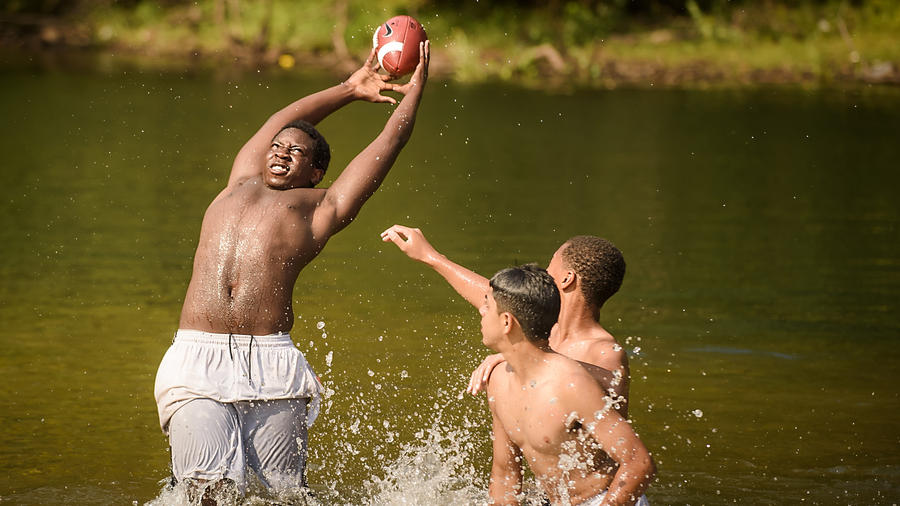
With the start of the high school fall sports season just a few days away, many teams ran into an unlikely obstacle Tuesday: record heat that canceled practices and scrimmages.
Lewis Mills of Burlington had a doubleheader scrimmage against Farmington in boys and girls soccer scheduled at Nassahegan Field in Burlington.
The Wethersfield boys soccer team was scheduled to scrimmage against Guilford and Naugatuck in Glastonbury. The Middletown boys soccer team was going to scrimmage at East Hampton and the girls soccer team was scheduled to scrimmage at Southington. Glastonbury had a boys and girls cross country scrimmage with five teams scheduled.
But they were all canceled because of the heat. According to the National Weather Service, the temperature reached a record 96 degrees at Bradley International Airport in Windsor Locks Tuesday afternoon, breaking the previous record of 95 degrees, set in 2007. The weather led to early dismissals for some schools and the opening of cooling centers in cities and towns.
“I think it was the right move, honestly,” Lewis Mills boys soccer coach Ben Kulas said. “I would love nothing more than to get out and, at the very least, get a training session in, but I just don’t see the reward outweighing the risk. There really isn’t much in my opinion that either program can get out of putting players in an environment where it’s 95 degrees, humid and hard to breathe and expect to compete at a high level.”
Kulas said the decision was made early Tuesday. Coaches were also warned on Sunday that there was a possibility of a cancellation.
“Our superintendent emailed the town on Sunday explaining precautions the district was taking, including potentially canceling activities after school,” Kulas said. “Once that came out and I saw other schools dismissing early and canceling games I knew there was minimal chance for a game or training [Tuesday].”
Simsbury athletic director Dane Street said practices for football, boys soccer, girls soccer, boys cross country and crew were delayed until later in the afternoon or early evening. Other Simsbury teams had optional practices. Glastonbury also had a modified practice schedule, with shorter practices starting after 5 p.m., which were optional for athletes, with more frequent water breaks.
“I compare it to the winter when early in the day the roads are not good, but by later in the day, the conditions are better,” Street said.
The Middletown football team’s practice was moved indoors into the air-conditioned gymnasium. Middletown’s main athletic field complex has an artificial surface, which produces more heat than a grass field.
“When I took the heat index, combination of temperature and humidity index, [about 11 a.m.] it was 132, which is an extremely dangerous level,” Middletown athletic director Elisha DeJesus said.
Even the Middletown crew team’s practice on the Connecticut River was canceled.
West Hartford athletic director Betty Remigino-Knapp did not cancel practices or scrimmages Tuesday but did modify them. She and her athletic staff and trainers have worked closely with Doug Casa, the CEO of the Korey Stringer Institute at UConn, which provides information, resources, assistance and advocacy for the prevention of heat-related illnesses and sudden death in sports.
“We have a heat protocol we follow,” Remigino-Knapp said. “We determine what we are going to do based on that and adapt our practices accordingly.”
The West Hartford schools follow a chart that shows what level of activity is appropriate for the heat index, which is relative humidity and temperature; what the rest-to-work ratio should be for athletes and how much protective gear football players may safely wear.
That means more frequent, and longer, rest periods and more scheduled mandatory water breaks, with a trainer monitoring the athletes. There is also a cooling tank at each high school filled with ice water in case an athlete has a heat issue and needs to be cooled quickly.
There were soccer scrimmages at both Conard and Hall high schools Tuesday but they played quarters instead of halves, with longer breaks in between and a lot of substitutions. Football players wore only helmets and shoulder pads.
Remigino-Knapp said she received calls from parents concerned about the heat, after hearing reports of other schools getting out early and canceling practices, so she emailed the school’s protocol and guidelines to parents.
Casa, a professor of kinesiology at UConn, said many schools use the Stringer Institute’s resources and guidelines and the institute has worked closely with at least 25 to 30 high schools in the state to help prevent heatstroke and heat-related illness among athletes.
“I don’t think you have to cancel practices if you have a trainer and if you have guidelines,” Casa said. “But I think it’s wise to cancel if you don’t have [medical] people around.”
Casa said he got a call from a local soccer organization wanting to know if it should practice Tuesday.
“I told them I would recommend canceling today,” he said. “It’s still going to be in the 90s by 5 p.m. and there’s no medical staff and the kids haven’t been practicing that much and you don’t know their status. It’s different with a high school team that has been practicing for a month, has medical staff and they have guidelines and appropriate modifications.”
The weather is supposed to be as hot with more humidity Wednesday.
“Tomorrow’s a new day,” Glastonbury athletic director Trish Witkin said. “We will review everything again tomorrow.”
Courant staff writers Matthew Conyers and Tom Yantz contributed to this story.